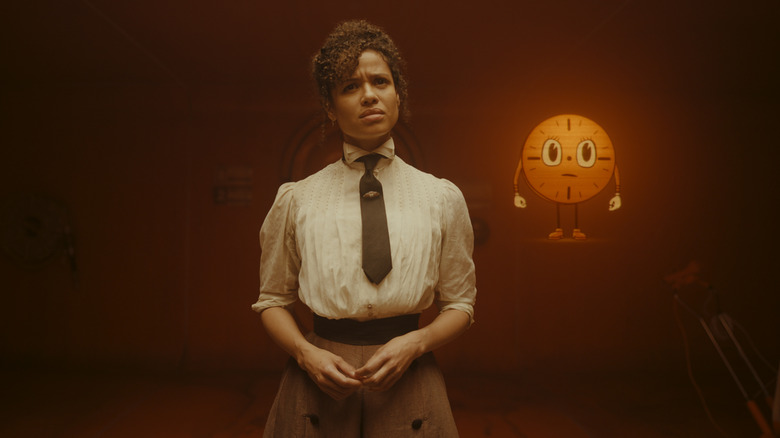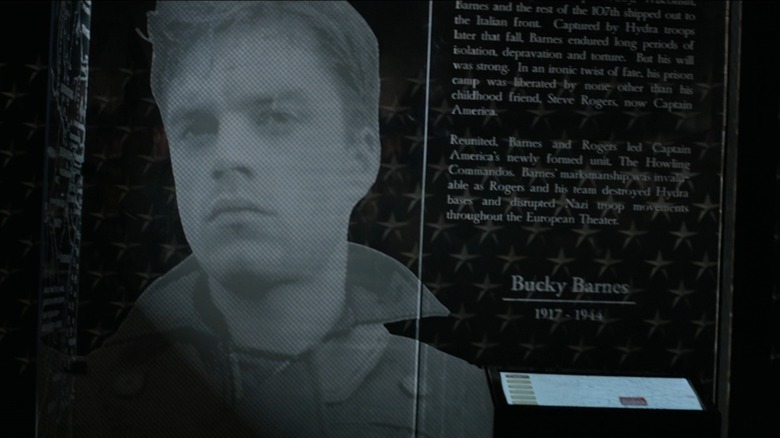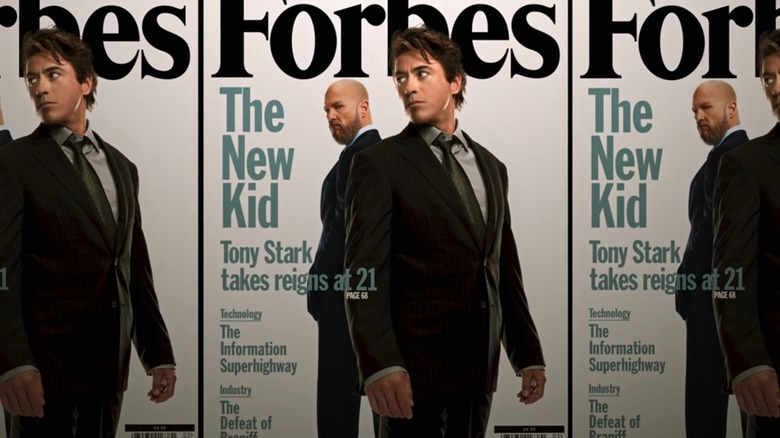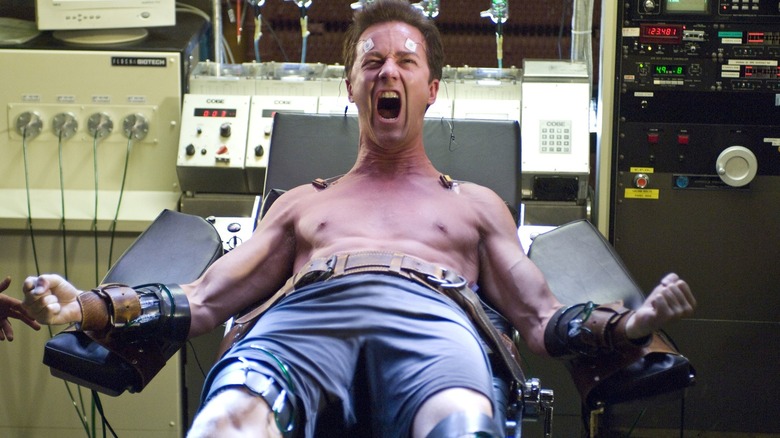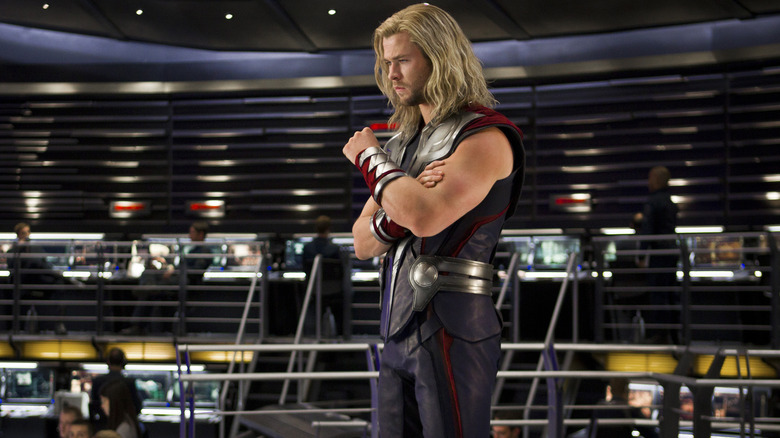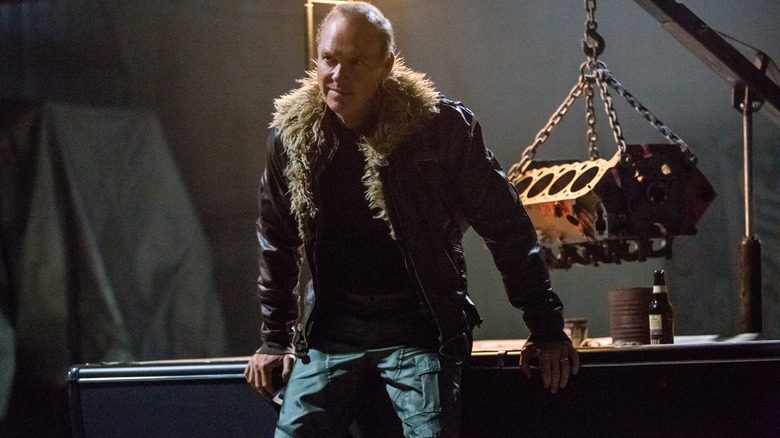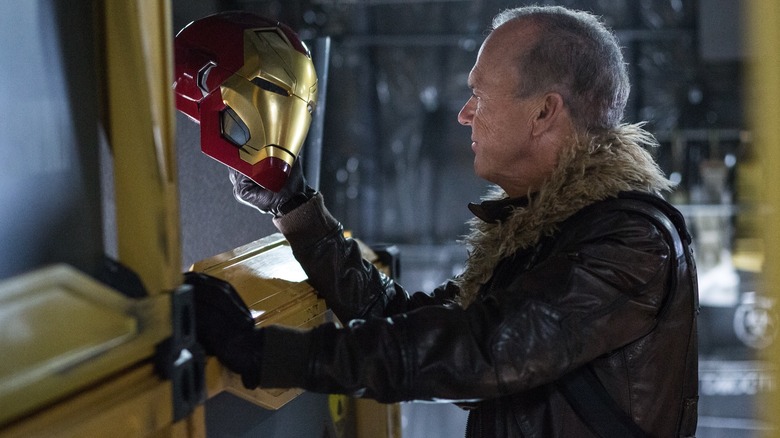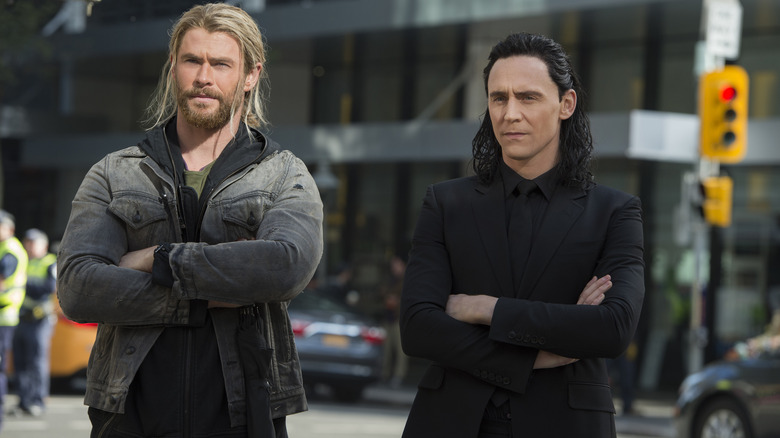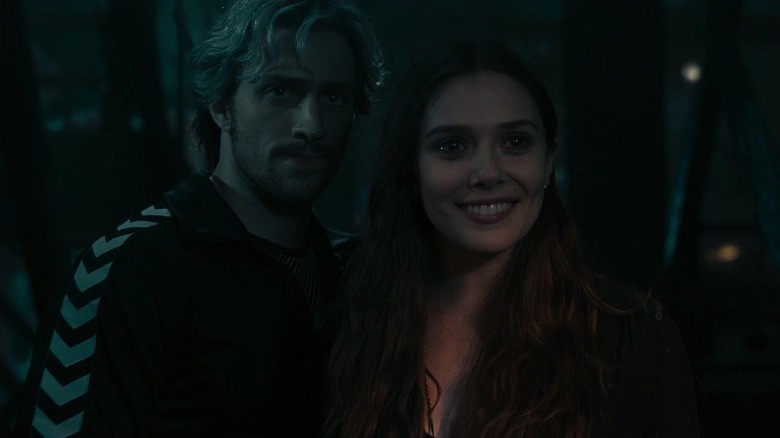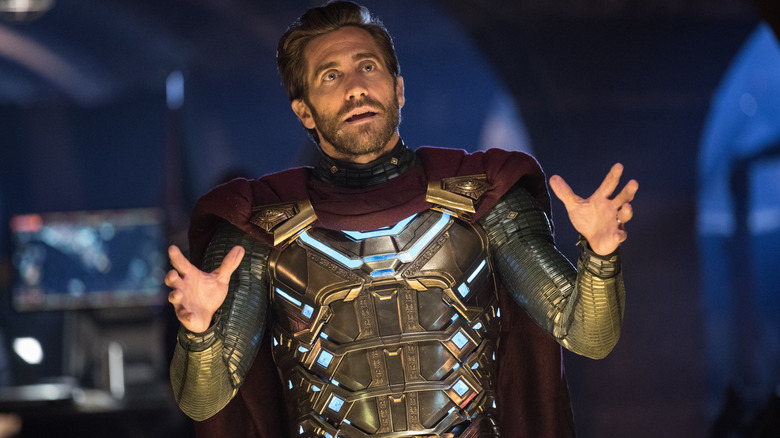Here Are All The MCU Timeline Mistakes That Marvel Studios Has Officially Acknowledged
Look, I know things aren't running quite so smoothly over at Marvel Studios. If you're not fully on board with the idea that it's time to sound the death knell for this franchise, well, even the biggest fans would have to admit that the golden goose has lost a bit of its luster recently. To paraphrase the tagline of "The Social Network," one doesn't become the biggest IP on the planet without making a few missteps along the way. Of course, some flaws are more forgivable than others. While we probably won't be letting "Secret Invasion" slide anytime soon (those of us who actually bothered to watch that misbegotten series, at least), it's much more understandable that Kevin Feige and his cohorts would accidentally cross a few wires while untangling the dense, interconnected timeline(s) of the MCU.
Luckily, the studio is well aware of every obsessive fan's complaints in that regard. In a new book titled "Marvel Studios: The Marvel Cinematic Universe: An Official Timeline," from authors Anthony Breznican, Amy Ratcliffe, and Rebecca Theodore-Vachon, the fan-friendly resource breaks down all of the events of the MCU to this point. That includes all of those apparent contradictions that internet sleuths and hardcore nerds have jumped all over — and a few that may not have even occurred to them, too. Throughout the book, the peppy AI Miss Minutes appears (presumably while taking a break from all the multiverse chaos in "Loki") to address "Redline Alerts," or instances of continuity errors that slipped by the filmmakers and made it on-screen.
These "corrections" are all delivered in good fun and fully in-character as Miss Minutes, mind you. And that's exactly the right tone to strike for (relatively meaningless) slip-ups. So here's every instance where the MCU needed a mulligan, in chronological order.
Catching a train in Captain America: The First Avenger
In many ways, it was one of the formative moments on the way to Captain America (Chris Evans) becoming the hero we all came to know and love. When his bestie Bucky Barnes (Sebastian Stan) fell to his "death" from that train in the Alps late in "Captain America: The First Avenger," Marvel devotees recognized exactly what storyline this was setting up. But what about the pesky matter of when this actually happened? As it turns out, there were two contradictory dates offered between "The First Avenger" and its sequel, "The Winter Soldier," when Cap (and eventually Bucky) visit a WWII exhibit in the Smithsonian Museum. So what's the right answer? According to Miss Minutes, it must've been a clerical error:
"Howdy folks! When did Bucky fall from that train? We'd all like to know! The Smithsonian's Captain America exhibit says 1944, but Arnim Zola claims he was captured in 1945. Those Analysts must be gettin' their britches in a stir! Let me investigate who filed that paperwork."
Stark's family history in Iron Man
Here's another mind-bender for you and, ironically enough, it has to do with "Captain America" sequels muddying up the timeline all over again. In a flashback sequence in "Civil War," we're brought back to the moment when Tony Stark's (Robert Downey, Jr.) famous parents die in a horrific car accident (caused by a mind-controlled Bucky, of course) in the year 1991. But here's the rub: Way back in the first "Iron Man," an awards ceremony in Las Vegas plays a highlight video of Tony's accomplishments throughout his early life. Among the details is that, after his father's friend and business partner Obadiah Stane (Jeff Bridges) stepped in to take control of Stark Industries, Tony eventually ascended to the throne himself at the age of 21 sometime after the deaths of his parents. If we take the "Civil War" flashbacks at face value, a 21-year-old Tony mourned his parents' deaths and then immediately took over Stark Industries? Hmm, sounds a bit messy. So what to make of this little discrepancy? Once again, Miss Minutes has us covered with a handy (and rather convenient) explanation:
"Howdy, y'all! A lotta years from now, a Las Vegas awards ceremony will play a sizzle reel that suggests Tony Stark didn't take over the family business until he was 21. But if he was already 21 when his parents were killed, what gives? It was a tumultuous time for Stark Industries and Obadiah Stane took the helm in the interim, so maybe the video glossed over finer details to keep it dramatic!"
Ivan Vanko's past in Iron Man 2
Ah, 2010. Remember when "Iron Man 2" came out and Marvel learned a tough early lesson about cramming too much shared-universe connections in an otherwise standalone film? That turned out to be a pivotal moment in early MCU history, but that's not what we're here to rehash. No, we're going to be much more myopic than that. The film's villain, Ivan Vanko (Mickey Rourke), turns out to carry a lifelong grudge against Stark — or, rather, his dad Anton certainly did. That backstory is explained to viewers during a few separate rounds of exposition, one delivered by Stark's loyal AI-butler JARVIS and another thanks to all those files dumped by Nick Fury (Samuel L. Jackson). But, for the eagle-eyed viewers among us, apparently there was a bit of a mix-up regarding when, exactly, Anton defected from the Soviet Union to the United States. You'd better believe that, in "Marvel Studios: The Marvel Cinematic Universe: An Official Timeline," Miss Minutes comes up with a way to make this fit in our collective head-canon:
"Hi there, folks! When JARVIS tells Tony Stark about Anton Vanko's history, he says the Soviet physicist defected to the United States in 1963, but a yellowed newspaper Stark reads cites Oct. 16. 1966. During the Cold War, sometimes high-level defections were kept classified for several years — or it might just be a misprint!"
Smashing the timeline in The Incredible Hulk
Okay, just breathe in and breathe out. Don't Hulk out on me, folks. We'll figure out this next one together, I promise. In perhaps the messiest example of a Marvel movie being unable to decide when exactly it takes place, 2008's "The Incredible Hulk" provides all sorts of contradictory information. Depending on what props you pay way too much attention to during the film, the events of the movie either take place in 2007, 2008, or, as is most commonly accepted, 2010. For the more logic-minded fans among us, I'm afraid that some things simply don't have a good explanation beyond a lack of attention to detail (which, again, aren't all that important in the long run). Hilariously, Miss Minutes doesn't even bother to dress this one up with some pithy solution. And when an all-knowing holographic AI is throwing her hands up in defeat with the catch-all response of a "disruption in the timeline," you probably should, too!
"Greetings! Y'all might've noticed that the email Bruce Banner sends to Dr. Sterns is dated June 12, 2008, and the military orders sent to Emil Blonsky are dated 2007, but all this seems to happen in 2010! This disruption in the timeline is one the TVA will have to investigate lickety-split!"
Thor's arrival on Earth in The Avengers
Aww, just look at baby, brooding Chris Hemsworth back in his "The Avengers" days of (relative) anonymity! Back then, Thor was just being established as the God of Thunder who would eventually become a fan-favorite in the series, which meant that a lot of his backstory was still being made up on the fly. So certain elements, like the exact details of his long life, were largely left up to the imagination. But that hasn't stopped some from noticing certain bits of dialogue that seem to throw a wrench in established canon. Take, for example, Thor's insistence that he only first arrived on Earth "recently" (meaning, the events of the first "Thor" movie). Obviously, that wouldn't line up with what we know about his previous run-ins with our planet, but luckily Miss Minutes hand-waves this thorny little issue without breaking a sweat. Seriously, she could be a politician or something.
"Hi Folks! Were y'all thrown when Thor said he first came to Earth recently? Just remember, Selvig notes that Thor's mythology dates back centuries and the Eternal Kingo says a young Thor used to follow him around. Thor was simply sayin' it was the first time coming to Earth in his current adventures! Not worth putting Analysts on this one!"
Revisiting the Battle of New York in Spider-Man: Homecoming
Alright, here's the blatant goof you've probably been waiting for, and, to their credit, Marvel has already fessed up about this major oversight (as we've covered before). So, "Spider-Man: Homecoming" begins with a flashback to the aftermath of the Battle of New York, aka the climactic third act sequence of "The Avengers." Most fans naturally assumed that the timeline of the movie roughly corresponded to real-time, meaning that a movie like "Homecoming" releasing in the year 2017 ought to take place five years or so after "The Avengers," which came out in 2012. Not so fast! An early title card establishes that "Homecoming" takes place "8 years later," but that throws all sorts of irreconcilable wrinkles into the equation. Miss Minutes is all too aware of this fact and doesn't even try to make sense of it, amusingly enough:
"Hi again! Adrian Toomes says the Battle of New York was 8 years ago, but that event was only 4 years prior. This one's a real head-scratcher for us — I reckon an Analyst misplaced the case file."
On a lesser note, there's also another little error that I have a hard time believing anyone actually cares about. But that's the magic of this book: no detail, no matter how insignificant, goes unnoticed.
"Howdy! Maybe y'all noticed a poster for the Academic Decathlon hanging in Midtown High School that says the Washington, D.C. event is set for October. while another poster in Peter Parker's bedroom says it's in September. I'm gonna ask someone about this, but everyone's on their pie break at the moment!"
Other odds and ends in Spider-Man: Homecoming
Oh, you want to get nuts? Let's get nuts! Sorry, I seem to have gotten my Michael Keaton superhero movies a bit mixed up. Anyhow, we're now diving headfirst into the absolute minutiae of "Homecoming." If that earlier error wasn't minor enough, we've got a couple more that'll get your head spinning if you think too hard about them. One involves the heist staged on Stark's plane, full of his personal effects. When the camera focuses on one of those familiar Iron Man suits, specifically the Mark 42 suit that featured throughout "Iron Man 3," all sorts of questions are raised ... given that, you know, Stark destroyed all of them at the end of the threequel. Once again, take it away, Miss Minutes:
"Hiya! Was that Tony Stark's Mark XLII suit on the cargo plane headed for the Avengers Compound? That's mighty strange, considering Tony blew it up while fighting Aldrich Killian! IF he rebuilt it, that plane crash just means he'll have to build it again... golly!"
The next one has to do with Donald Glover's small role as Aaron Davis. I'm sure everyone out there was shaking in their boots about the fact that the movie misidentifies his age based on his actual year of birth, so Miss Minutes comes through in the clutch yet again to assuage any concerns:
"Well, hello! Peter Parker asks the 'Karen' A.l. to run a facial recognition scan on the buyer he saw under the bridge during Liz's party. Karen identifies 'Aaron Davis, age 33' — but calls up a file that says his birth date is April 19th, 1984 — which would make him only 32. Mmm-hmm, with data entry y'all can never tell which input was right!"
More age-related shenanigans in Thor: Ragnarok
Will the real Thor please step forward? Obviously, Marvel took a little while to finally get a handle on the (admittedly tricky) character of Thor. But even his best film, "Thor: Ragnarok," took a few creative liberties every now and then regarding the age of these Asgardians. First up is the matter of Odin (Anthony Hopkins), which rears its head during Thor's early confrontation with Surtur. Can even Odin live thousands upon thousands of years? The official answer: Maybe, maybe not.
"Hello there! Thor tells Surtur, 'I thought my father killed you half a million years ago.' Now, we know Asgardians live a long time, but do they live that long? It's hard to say how long Odin has been around, 'cause sometimes he falls into the Odinsleep."
The more Thor-centric thorn in our side has to do with his exact age. Is he actually 1500 years old? That might be tough to reconcile with previous information, but don't let that stop you from enjoying the only Taika Waititi movie he ever made for Marvel. That's right, "Thor: Love and Thunder" simply never happened. Nope.
"Why, hello! Thor says he's 1500 years old, but wasn't he just a baby around 595 CE? I'd have an answer for y'all now, but Casey just spilled coffee all over the mainframe, bless his heart."
Making a mess in WandaVision
Everyone's favorite Avenger Pietro Maximoff (Aaron Taylor-Johnson) might not have appeared in the flesh in "WandaVision," but that didn't stop the Disney+ series from lightly departing from what it had already established previously regarding his and Wanda's (Elizabeth Olsen) date of birth. It's not the biggest mistake we've come across throughout the MCU, of course, but I'm sure somebody, somewhere noticed this and cried foul. Dear reader, if that's you, then please read this and let it finally put your mind at ease.
"Howdy! In a briefing to the security team. F.B.I. agent Jimmy Woo says Wanda and her brother Pietro were born in Sokovia in 1989 to Iryna and Olek Maximoff, but the classified S.W.O.R.D. file he shows them cites her birth year as 1988. Heavens to Betsy! Which is right? It's hard to know for sure because so many records were destroyed during Sokovia's conflicts — but that's just me speculating, we'll dive a little deeper to see what we can find."
The Mysterio mystery in Spider-Man: Far From Home
Riddle me this: How does a normal human being pretending to be a superhero actually end up being right about all the multiversal nonsense he was spewing before it had actually been confirmed? That's a fantastic question, and not one that has an easy answer. Jake Gyllenhaal's Quentin Beck/Mysterio is clearly meant to fool audiences into thinking he truly knows what he's talking about when he refers to "Earth-616," one of just many parallel dimensions in the MCU. The fact that this really is the name for the dimension only makes things more confusing in retrospect, when we find out that this villain was just some unimportant fella who held a grudge against Tony Stark for entirely unrelated reasons. Miss Minutes, please shed some light on this last and most important discrepancy in the MCU:
"Hi y'all! How did con-man Quentin Beck know this dimension's called "Earth-616" when the existence of the Multiverse hasn't been proven? Good question, y'all! Maybe Beck picked up Selvig's theories over a decade ago-but now I'm the one gettin' ahead of things."
